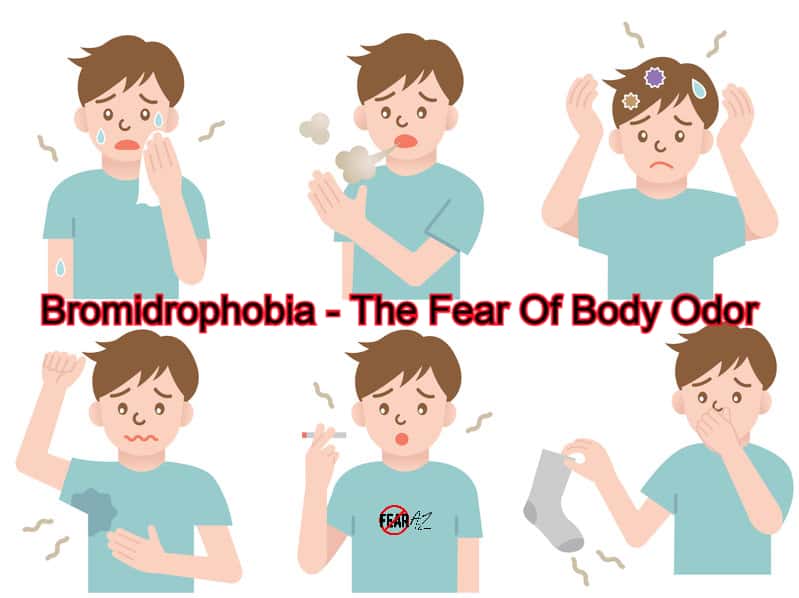Share This Article
Decoding Bromidrophobia: The Fear of Body Odor
Do you find yourself always trying to smell your breath and underarms? Have you ever been caught in this embarrassing act?
Do you worry about your supply of breath spray or layer on the underarm deodorant? Would you prefer that cologne came in quart-sized jars?
Is bromidrophobia a phobia of fear or disgust?
If you have these tendencies, then you may suffer from bromidrophobia, or the fear of body odor. Living in constant fear of smelling bad or trying to get rid of body odor isn’t easy. But like any other phobia, bromidrophobia can be managed. Let’s explore this fear in detail and learn what you can do to tackle it.

Some Basic Facts about Bromidrophobia
Is there a fear of body odor? The answer is yes! Bromidrophobia is the phobia of body odor, and it’s quite common.
While personal hygiene is essential, the human body emits natural scents. In most cases, these bodily smells act as chemical messengers. However, if you suffer from a fear of perceived odors, you may constantly imagine that you smell bad. It’s a serious condition that is sometimes linked with obsessive compulsive disorder (OCD).
Here’s the thing: Body odor is natural and inevitable. When you suffer from the fear of smelling unpleasant, it starts to affect your day-to-day activities. First off, it destroys your sense of confidence. It can also make you highly self-conscious. Even if you can sometimes convince yourself that you smell okay, you might find yourself avoiding certain activities that can cause you to smell or expose you to smells of others. You may even end up avoiding social situations.
If you regularly have apprehensions about body odor, then you might wonder where to draw the line between being hygienic and going overboard. When the thought of your perceived body odor—or even another’s—starts to cause anxiety, that’s when you’ve crossed the line.
What Causes Bromidrophobia?
There are many causes of bromidrophobia. Fear of body odor can often be diagnosed as olfactory reference syndrome (ORS). ORS is a mental condition that causes a person to believe they have a foul body odor. It’s often linked with OCD and body dysmorphic disorder (BDD). Those with this disorder may show signs of obsession and fear of body odor. But ORS and bromidrophobia are different conditions. Bromidrophobia is concerned with getting rid of smell while ORS is a condition that involves the obsessive behaviors this fear might induce. ORS is more severe as it may induce compulsive and destructive thoughts in those who struggle with it.
Just like most phobias, the most common bromidrophobia cause is experience. In today’s society, everyone is expected to adhere to a high standard of hygiene. Bad body odor is frowned upon even among children. It may drive them to bully and call out their friends in unpleasant situations. Children who were repeatedly called out and ridiculed for their body odor or foul breath may grow up to be excessively self-conscious and susceptible to the reactions of others.
We know that bromidrophobia is also the fear of someone else’s body odor. Therefore, the fear of body odor might also be linked to traumatizing experiences that may remind people of an aggressor or abuser’s body odor. In this case, perceiving foul odor from someone else may trigger their own trauma and anxiety.
Stress is also known to be a cause of bromidrophobia.
Symptoms of Bromidrophobia
Bromidrophobia symptoms are easy to detect. If you have a fear of body odor, you may often experience symptoms, because odor can be perceived anywhere. Someone suffering from the phobia might not show all the symptoms but just a few of them excessively. Here is the list of the more common bromidrophobia symptoms to watch for.
Mental/Emotional Symptoms
- Increased obsession with colognes and deodorants
- Excessive use of fragrances
- Engagement in extreme cleansing rituals
- Avoidance of public places
- Reluctance to visit locations with inadequate restroom facilities
- Avoidance of physical activities leading to sweating
- Feelings of anxiety and shame
- Restlessness
- Aversion to intimacy
Physical Symptoms
- Sniffing at yourself excessively
- Taking long and excessive showers
- Reluctance to eat smelly foods, such as foods with onions and garlic
- Over-scrubbing one’s skin during showers
- Brushing teeth more than three or more times a day
- Changing and washing clothes excessively
- Too much gum and mint intake
- High irritability and mood swings
How Do You Deal with Bromidrophobia?
No matter how inexplicable or irrational your fear of perceived odors is, it is treatable. Seeking professional help aside, you can try self-care efforts to tackle your bromidrophobia.
What Can You Do to Help Yourself?
Self-care for any phobia teaches you how to cope with it on your own terms. You can begin by coming to terms with your fear. Each time intrusive thoughts cloud your mind, write them down. Go into as much detail as you feel like; it will take your mind off your obsession.
Try relaxing your mind and body. Consider yoga and meditation. Yoga can assist in easing the effects of stress and anxiety. It improves concentration and memory. Yoga has a great impact on mental health and can help you in connecting with your inner self. Anxiety and fear can be reduced by watching yoga videos and practicing different poses daily.
If you regularly subject yourself to severe cleansing, try to gradually cut down on the time you spend on these rituals. If you take hour-long baths, decrease the duration by 15 minutes each day. Practice and practice some more until your body settles into the new routine. Also, try and think of things that make you happy when thoughts about body odor come to mind.
Professional Help for the Fear of Body Odor: The Options Available
Those with bromidrophobia can benefit from a range of treatments. The research on ORS has been very helpful in determining which treatments work well. For example, exposure therapy is a common bromidrophobia treatment that safely exposes you to your fear. During this exposure, you’ll learn ways of dealing with your reactions. The main aim of the therapy is to assure you that body odor won’t hurt you.
Cognitive behavioral therapy (CBT) is another common therapy practice. In CBT, you’ll work with your therapist to change the negative thought patterns associated with a fear of body odor. This form of therapy seeks to trace the root cause of your phobia. It tries to break it down to find a solution that helps combat irrational fear.
Talk therapy is another type of counseling that can help you express your feelings and concerns. It focuses on helping you learn more about yourself, and encourages you to let go of your unfounded worries.
Learning to Cope with Bromidrophobia
If you live with bromidrophobia, treatment can help you deal with your fear. However, nothing can completely take your phobia away. It’s important to come terms with your fear, and learn how to manage your phobia.
Wrapping It Up
Bromidrophobia is a phobia that tends to preoccupy your mind morning, noon, and night. The most healthy way to combat this fear is by using relaxation techniques to manage your anxiety. Also, try to confront the notion that body odor can only be detected in extreme cases. Besides, studies have shown that a natural body odor may attract the opposite sex. So next time you panic about smelling bad, give your thoughts a rest.





